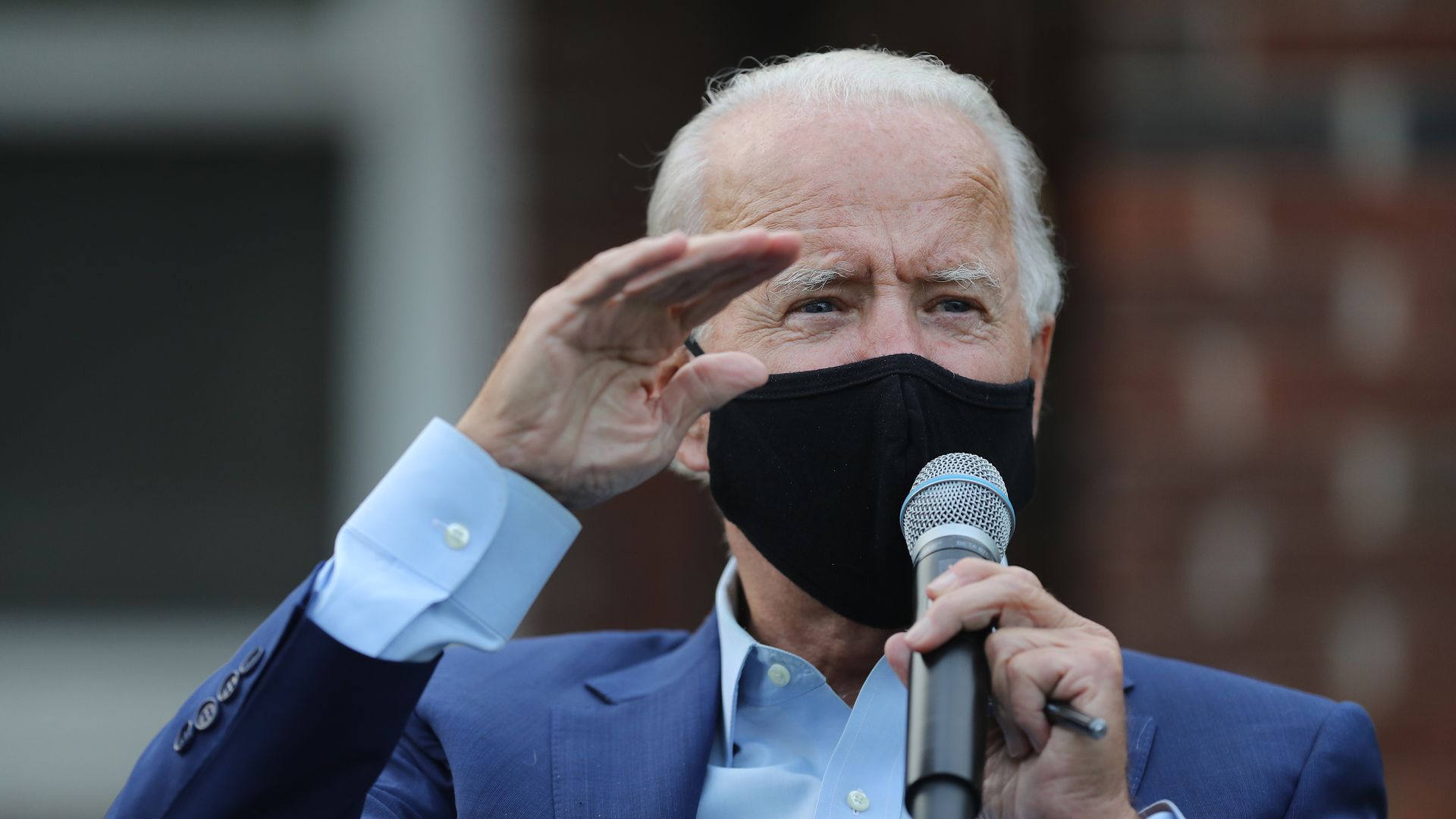Biden's econ warriors
Add Axios as your preferred source to
see more of our stories on Google.

Photo: Chip Somodevilla/Getty Images
Joe Biden is seeding his advisory boards and transition team with center-left economists and Black and Hispanic leaders as he prepares to confront income inequality and racial disparities exacerbated by the pandemic.
Why it matters: The Democratic nominee is signaling that if he wins in November, his administration may pivot away from the pro-Wall Street sentiment that pervades not just Trump's White House, but also reigned in Bill Clinton’s and Barack Obama’s administrations.
Details: Biden added two new co-chairs to his economic advisory council over the summer, sources tell Axios:
- William Spriggs, an economics professor at Howard University and chief economist to the AFL-CIO.
- Luis Ubiñas, an investor, former president of the Ford Foundation and former McKinsey partner.
Biden has already put Big Business on notice that he’s serious about a progressive agenda, telling CNN's Jake Tapper last week that, if elected, on "day one," he would begin a push to increase the corporate tax rate to 28%, regardless of the unemployment rate.
But, but, but: Advisory councils don't necessarily set policy and Biden has hundreds of outside advisers. In-house advisers still tend to be the last voices in a candidate's ear.
The big picture: Many of Biden's current in-house economic advisers watched during the Obama administration as political aides deferred to Wall Street and congressional dealmakers over deficit concerns. They regarded that as a mistake and are determined not to let Biden underspend if he's elected.
- Jared Bernstein and Ben Harris, both of whom were Biden's chief economic advisers under Obama, are left-of-center economists who consistently pressed for more government stimulus and banking rules in the Obama White House.
- The campaign team also includes policy director Stef Feldman, senior adviser Jake Sullivan and Gene Sperling, who was an NEC director for both Obama and Clinton.
Jeff Zients, Obama’s last NEC director and a co-chair of Biden's transition team, is also pulling together a diverse transition roster that includes former aides to some of the party’s loudest progressive voices:
- Gautam Raghavan, chief of staff to Rep. Pramila Jayapal (D-Wash).
- Julie Siegel, who worked in the Obama White House before leaving to help establish the Consumer Financial Protection Bureau with Elizabeth Warren.
- Cecilia Munoz, Obama’s former head of the Domestic Policy Council, who worked at the National Council of La Raza.
- Felicia Wong, president and CEO of the Roosevelt Institute.
The big question: Will Elizabeth Warren join a Biden Cabinet as Treasury secretary or attorney general, or stay in the Senate?
- From the Senate, she'd effectively hold veto power on Treasury secretary, potentially dashing the hopes of financial services titans like BlackRock’s Larry Fink or Centerview Partners' Blair Effron.
- But she might accept Fed Governor Lael Brainard, who was confirmed 61-31 in 2014 and was Obama’s first undersecretary of the Treasury for International Affairs.
Be smart: Warren and Bernie Sanders, not Wall Street, will help Biden decide which economic names get sent to the Senate for confirmation if Biden wins. And progressive economists, more than big bankers, will drive the policy.
Spriggs and Ubinas join a team of outside economic advisers that also includes:
- Heather Boushey, Hillary Clinton’s top economic adviser in 2016.
- Austan Goolsbee, Obama’s second Council of Economic Advisers chair.
- Byron Auguste, an Obama deputy director of the National Economic Council.
- Indivar Dutta-Gupta, co-executive director at the Georgetown Center on Poverty and Inequality.
Between the lines: The Biden campaign closely guards details about outside economic advisers, leading to headlines like this one in the New York Times in June: “Biden’s Brain Trust on the Economy: Liberal and Sworn to Silence.”
